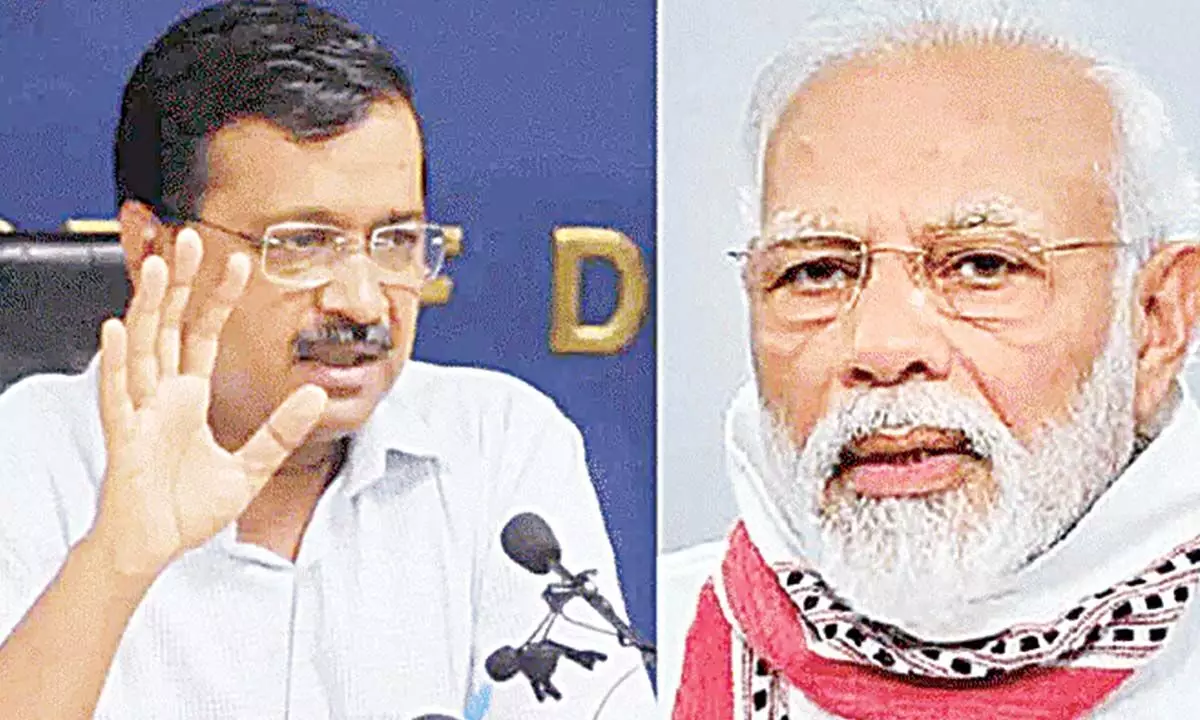Modi proposes, Kejriwal disposes
The freebie culture is about unbridled populism; this is hurting the nation. Worse, all political parties, including the PM’s own, are vying with each other in the game of competitive populism
image for illustrative purpose

Political parties seem to have forgotten a basic principle: you can't spend more than you earn. This is an eternal truth which, when lost sight of, has consequences for everyone and everything - be it an individual, a company, any other organization, a State, or a nation. Sri Lanka is a recent example of the last one
When fractious politicking invades economic policy, progress is halted or hurt. Delhi Chief Minister Arvind Kejriwal's irrational support for freebies is a testimony to that invasion. And his response to Prime Minister Narendra Modi's concern over ever-proliferating freebies is irresponsible, to say the least.
The Prime Minister equated freebies with what in Hindi is called 'revdis' (a kind of sweetmeat). He rightly said on July 16, "Nowadays, every effort is being made in our country to introduce the culture of collecting votes by distributing freebies. This culture of freebies is very dangerous for the development of the country. The people of the country, and especially my youth, need to be very careful of this freebies culture. The people following this culture will never build new expressways, airports or defense corridors for you. They feel that they will buy the people by distributing freebies to them. Together we have to defeat this approach and remove the freebies culture from the politics of the country."
The freebie culture is about unbridled populism; this is hurting the nation. Worse, all political parties, including the PM's own, are vying with each other in the game of competitive populism. But just because everyone does something improper doesn't mean that it has become proper. And if someone questions that practice, they should be lauded.
But Kejriwal, who also heads the Aam Aadmi Party, has only derision and disdain for PM Modi. The Delhi CM believes that free electricity or free public transport for women in Delhi are not 'freebies' but merely a State discharging 'constitutional responsibilities' to create an equitable society.
This is factually inaccurate, for the founding fathers of our republic didn't mention anywhere in the Constitution or its preamble that the government should be distributing free goods and services. Nor was our freedom struggle about freebies. And an equitable society doesn't imply a system where people don't pay for the things they use.
Equating free education in government schools with politically motivated freebies is a disingenuous and dangerous equivalence.
Even worse is Kejriwal's attempt to play to the gallery. "A law should be introduced to declare such activity (writing off bad loans) as treason and people responsible should be punished. It should also be probed how much donations such people gave (to the ruling party). One party believes in parivaarwad (nepotism), while the other believes in dostwad (cronyism)," Kejriwal said.
This is dialogue-baazi, best suited for the 1980s' C-grade Hindi film hero, a jholawallah activist, or a demagogic, frustrated politician, not an incumbent Chief Minister. An important issue raised by the country's Prime Minister shouldn't be allowed to be dismissed with shrill rhetoric.
It is sad that all parties indulge in irresponsible populism and mad welfarism. While there can be justification for free education and healthcare, there can't be none for the distribution of grinders, washing machines, television sets, laptops, subsidized pilgrimage, free electricity, farm loan waivers, and so on.
While the Centre also indulges in populism, States do it with impunity. They seem to have forgotten a basic principle: you can't spend more than you earn. This is an eternal truth which, when lost sight of, has consequences for everyone and everything - be it an individual, a company, any other organization, a state, or a nation. Sri Lanka is a recent example of the last one.
There have been ample warnings against mindless populism. In May 2019, Reserve Bank of India Governor Shaktikanta Das highlighted the weaknesses of State finances. A November 2021 RBI report also underlined the mess farm loan waivers had occasioned.
In April this year, 15th Finance Commission chairman NK Singh denounced the economics and politics of freebies and populism. It is a "race to the bottom" and "a quick passport to fiscal disaster," he said.
Unfortunately, few politicians have heeded to such warnings. According to a recent report, freebies worth more than Rs 1 lakh crore have already been announced by various States in the current fiscal. Andhra Pradesh, Madhya Pradesh, and West Bengal are the leading States in the list, accounting for welfare schemes worth over Rs 67,000 crore.
The results are for all to see. A recent RBI study said, "We can identify a core subset of highly stressed states from among the 10 states identified by the necessary condition i.e., the debt/GSDP ratio. The highly stressed states are Bihar, Kerala, Punjab, Rajasthan and West Bengal." GSDP is state GDP.
The debt-GSDP ratio of Punjab is the worst - and worsening. It is projected to exceed 45 per cent in 2026-27. Response of the State government under AAP? Instead of gearing up to face the impending crisis, it freed around 51 lakh households of electricity bills from September. As if the cure for populism is more populism!
While the AAP's case may be conspicuous because of the high-profile media coverage the party and Kejriwal receive, other parties are not exactly striving to become fiscally responsible. Against this backdrop, the Centre is reported to be contemplating a mechanism to check States' profligacy. One hopes that the efforts to inject fiscal prudence into the system are not torpedoed by more political rhetoric.

